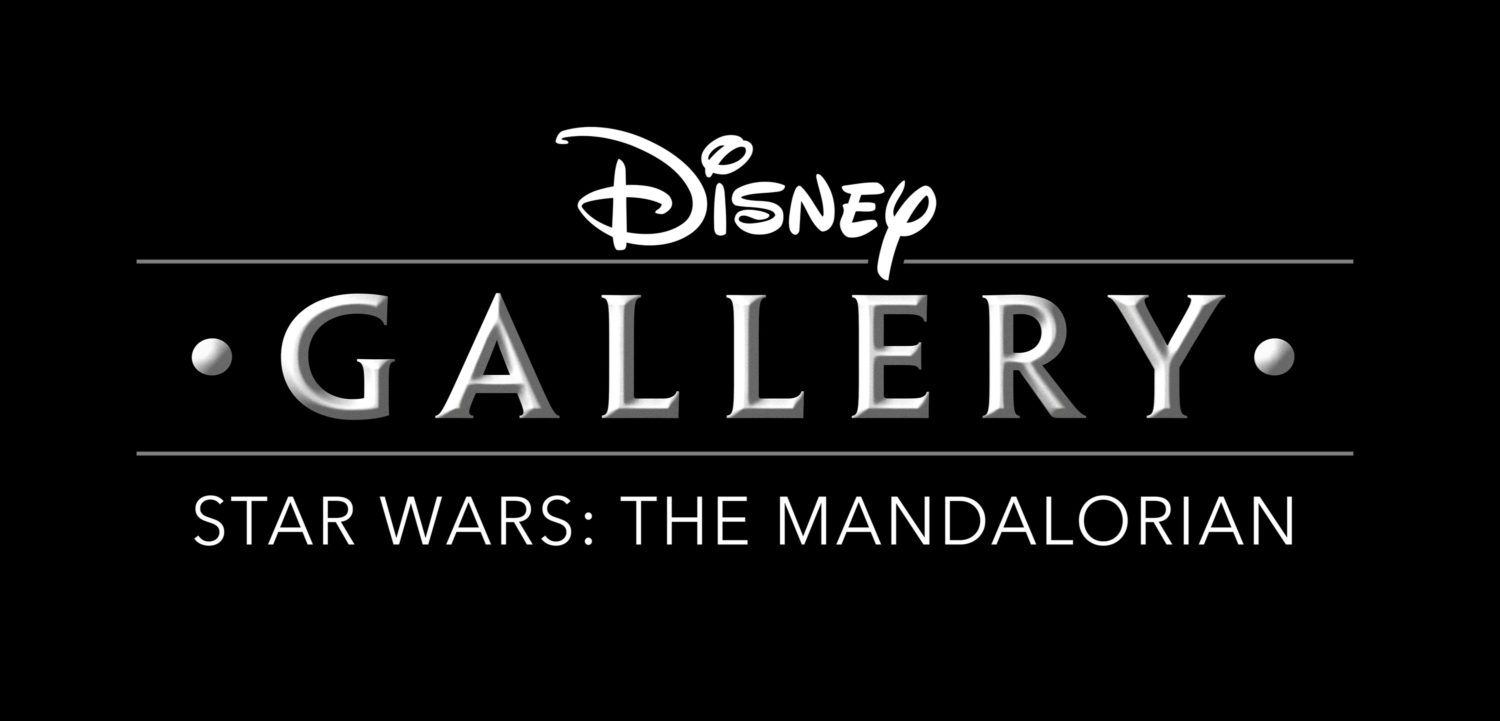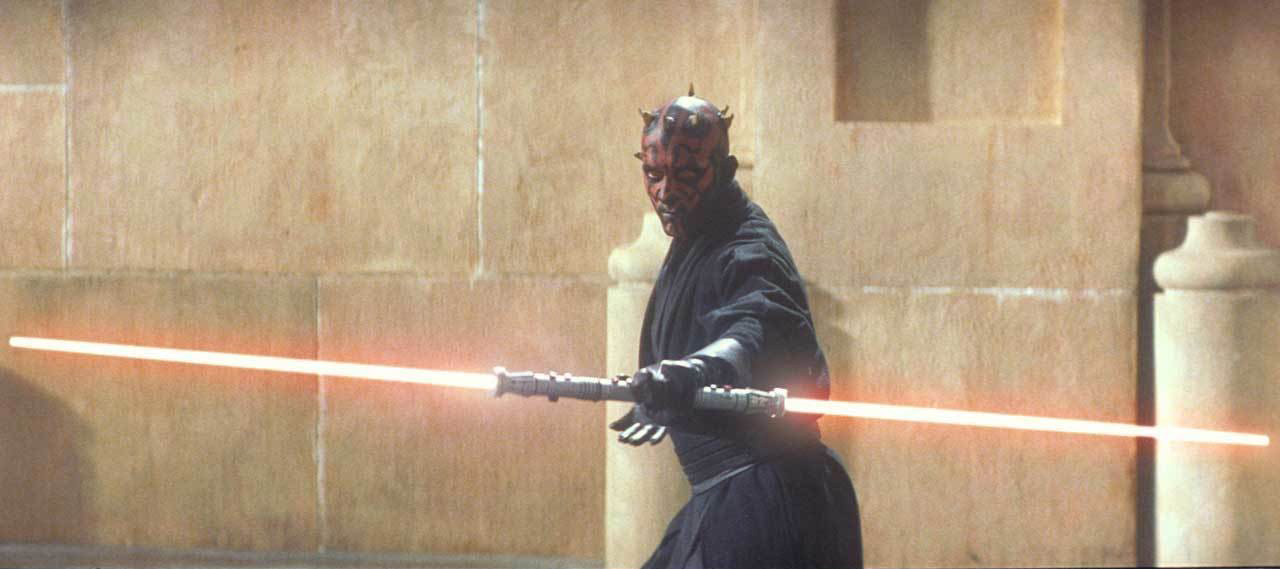 Disney
Disney The Mandalorian and the final season of The Clone Wars on Disney+, have some things in common. Both are carrying the weight of Star Wars fandom to new heights, and both have a huge influence by Dave Filoni, who has helped shepherd in The Clone Wars, Rebels, Resistance, and The Mandalorian. But while Filoni has influences in all that’s new, he also has a deeper connection with the older material having worked alongside Lucas for so many years. In the second episode of Disney Gallery: The Mandalorian, Filoni is influencing our views of the prequels once again with a 10-minute monologue about Qui-Gon, Darth Maul, Obi-Wan and Anakin’s connective tissue to Darth Vader, Emperor Palpatine, and Luke Skywalker. If you have a chance to watch, you should definitely do. But, if you can’t, it really is worth reading below:
The Hero’s Journey
Dave Filoni: “The prequels, I thought, were almost an impossible task. How do you tell the story that we’ve all grown up with and imagining who Anakin Skywalker was? You saw so many things in The Phantom Menace that you just imagined, like the Jedi Council, and none of it really was what I had expected. But I know now that’s just how creative George is. He just sees it differently and he’s laying it down.
I love the lightsaber fight with Darth Maul not because it’s a lightsaber fight but because George is so good at crafting why that fight’s important. Every time. Like you know, the Obi-Wan / Darth Vader fight [in Episode IV] isn’t like the most wonderfully staged necessarily combat that you’re ever gonna see but there’s so much at stake. It’s so meaningful when Obi-Wan dies we all feel like Luke. In Phantom Menace, you’re watching these two Jedi in their prime fight this evil villain. Maul couldn’t be more obviously the villain. He’s designed to look evil, and he is evil, and he just expresses that from his face all the way out to the type of lightsaber he fights with.
What’s at stake is really how Anakin is going to turn out. Because Qui-Gon is different than the rest of the Jedi and you get that in the movie; and Qui-Gon is fighting because he knows he’s the father that Anakin needs. Because Qui-Gon hasn’t given up on the fact that the Jedi are supposed to actually care and love and that’s not a bad thing. The rest of the Jedi are so detached and they become so political that they’ve really lost their way and Yoda starts to see that in the second film. But Qui-Gon is ahead of them all and that’s why he’s not part of the council. So he’s fighting for Anakin and that’s why it’s the ‘Duel of the Fates’ – it’s the fate of this child. And depending on how this fight goes, Anakin.. his life is going to be dramatically different.
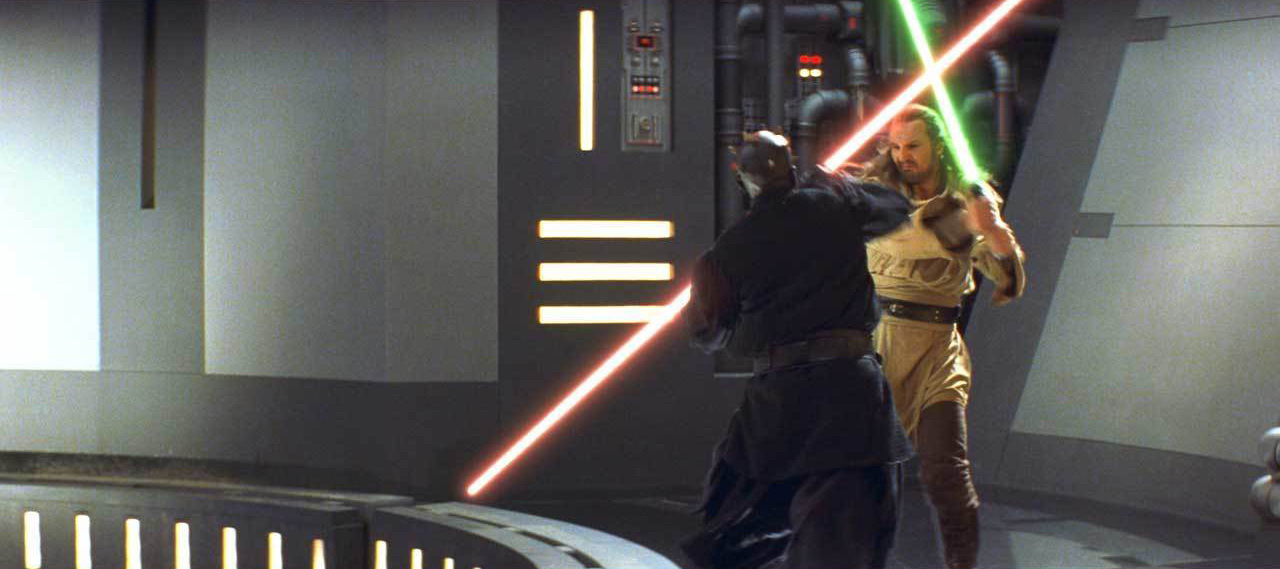
So Qui-Gon loses of course. So the father figure, he knew what it meant to take this kid away from his mother when he had an attachment, and he’s left with Obi-Wan. Obi-Wan trains Anakin at first out of a promise he makes to Qui-Gon, not because he cares about him. When they get Anakin, they find him on Tatooine, he says “Why do I feel like we’ve found another useless lifeform?” He’s comparing Anakin to Jar Jar and he’s saying “this is a waste of our time, why are we doing this, why do you see importance in these creatures like Jar Jar Binks and this ten-year-old boy? This is useless.” So, he’s a brother to Anakin eventually but he’s not a father figure. That’s a failing for Anakin. He doesn’t have the family that he needs. He loses his mother in the next film. He fails on this promise that he made, “mother, I’m going to come back and save you”. So he’s left completely vulnerable and Star Wars is ultimately about family. So that moment in that movie which a lot of people I think diminish, “oh there’s a cool lightsaber fight”, but it’s everything that the entire three films of the prequels hangs on, is that one particular fight. And Maul serves his purpose and at that point died before George made me bring him back, but he died.
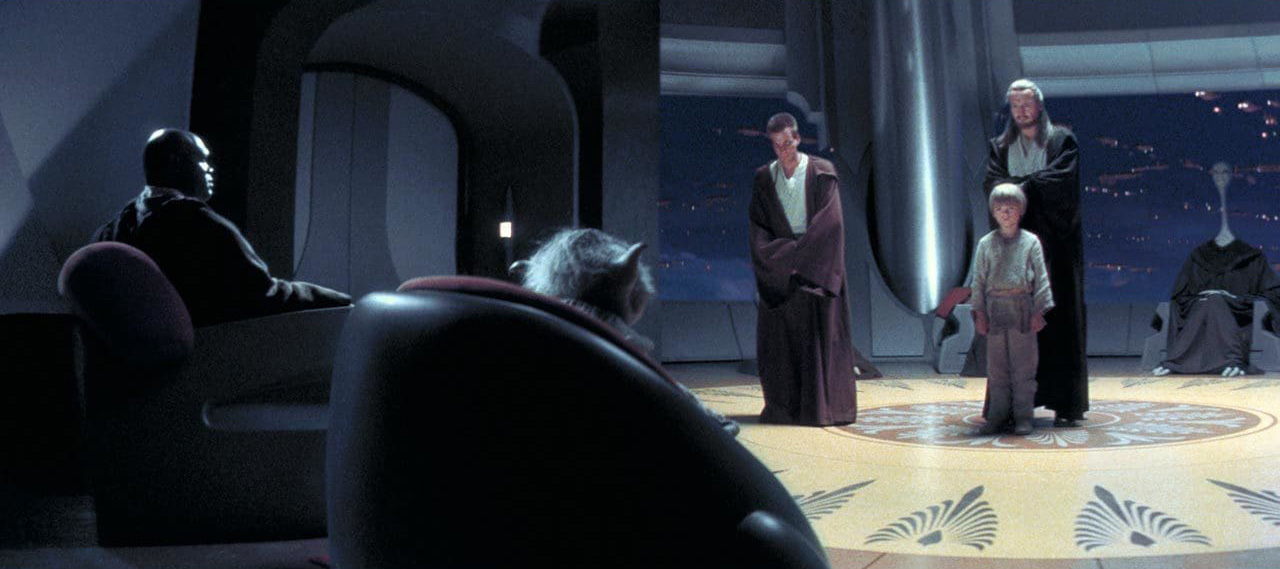
And that shows you again how the Emperor is completely self-serving. He doesn’t care, he’s just a tool and he’s using people, and now he’s going to use this child. That follows all the way through to the line which terrified me as a kid when the Emperor tells Luke, “you, like your father, are now mine.” And the idea, when I was a little kid, watching that movie of some evil person possessing my father, making him do things or making him be evil was terrifying. That was like a thought that was horrible. Also it’s amazing when you watch Return of the Jedi, that Luke has never done anything that I would call is a bad character, he has a tendency to be dark, and a lot of people wanted Anakin, “oh he should have been darker as a character”. It’s not true at all. I believe Luke would turn to the Dark Side in Return of the Jedi – I believe that was on the table. I believe he would kill the Emperor and because the way George arranged the story I knew that was the wrong thing to do. When he’s saying, you know, “you want your weapon” you know, “Strike me down, I am defenseless”. He wants him to give into his anger. He wants him to give into his hate. And the fear, the structure that George has laid out in all his movies is coming to fruition now. And the only thing that’s going to save him is NOT his connection to the Force. It’s not the powers he’s learned. It’s not all these things that are an advantage to him. That’s gotten him to the table but what saves Luke is his ability to look at all that and look at his father and say “No, I’m going to throw away this weapon. I’m not going to do that. I’m going to let that go and be selfless”. And he says you know “I am a Jedi, like my Father before me” but what he’s really saying is, and why I connect so powerfully to it is, he’s saying “I love my father and there’s nothing that you can do that’s going to change that”. And the Emperor can’t understand that connection. “Why wouldn’t you take someone offering all the power of the galaxy? Why won’t you take this?” And Anakin at that moment has to decide to be the father that he’s never had. He has to give up all the power of the galaxy and save his son. And that’s the selfless act that he does in return for his son. And that’s what saves him in turn. So the son saves the father, the father saves the son, and it works out perfectly. And I draw that line all the way from Phantom Menace to ‘Jedi‘.
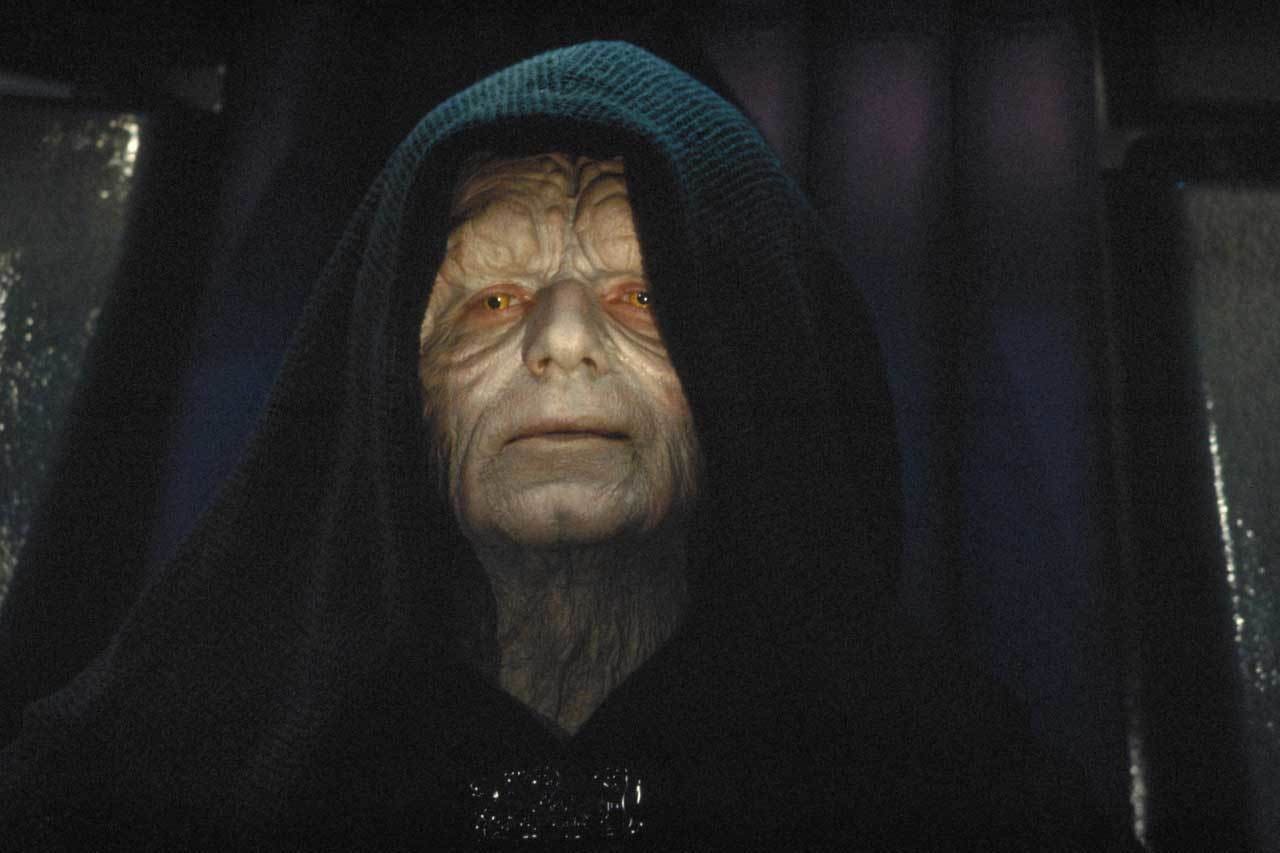
THAT’S the story of Star Wars. It’s all part of why it works and why we care. It’s not about X-Wings, it’s not about all these things we decorate Star Wars in – it’s important and it’s part of the genius of it. But we soulfully react, like, we don’t just want an action movie, we want to feel uplifted and Star Wars is an adventure that makes you feel good. You know, it makes me feel like ‘Wow, I want to be a part of that’. So that’s what I always go back to with Star Wars is this selfless act and this family dynamic which is so important to George, so important to the foundation of Star Wars. That’s in us. And what I like about it is, it’s really saying there’s a lot of hope out there, that we fundamentally want to be good people, we can all be driven to do terrible things but that we can persevere through selfless actions. So George has this hopeful story and it’s something that he’s reiterated most times I’ve seen him, you know, after we’ve been making things without him is, “remember to make these stories hopeful. Remember to give that to kids because they really need it”. And so that’s just something to keep in mind.”
Episode 2 of Disney Gallery: Star Wars: The Mandalorian is now streaming on Disney+
